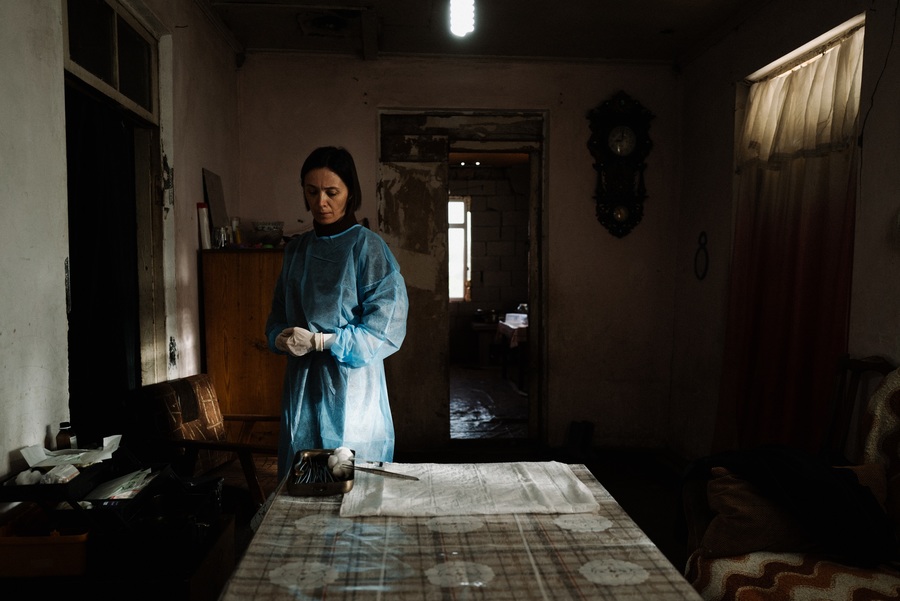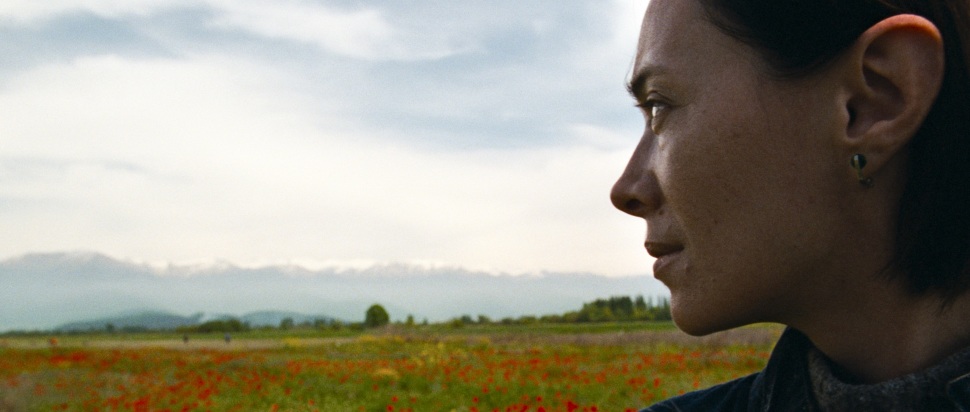April
After Beginning, Déa Kulumbegashvili returns with a profoundly affecting, wrenching abortion drama
Georgian writer-director Déa Kulumbegashvili explores the hurdles of womanhood in April, a stripped-down abortion drama thriving in the contrast between a hostile society and a generous nature. Like her arresting debut Beginning, this new film tackles a female-fronted, ordinary tragedy, with a story centred on Nina (Ia Sukhitashvili), an OB-GYN in a rural Georgia hospital. While abortion is technically legal in the country, religious and patriarchal constraints hinder access to the procedure outside of major cities. Those who can’t go to the likes of Tbilisi or Batumi have no choice but to seek the help of doctors like Nina, who puts her career on the line to perform unregistered terminations.
These secret procedures on kitchen tables are female-only rituals occurring away from prying eyes, orthodox fanaticism and male coercion. April is very clear in stating that women are regarded as little more than walking wombs and that anyone who prevents them from fulfilling their maternal role poses a threat to the status quo. Facing an internal investigation after a delivery results in a stillbirth, Nina finds her professional ethics questioned over her life-saving side gig. She can’t be both an abortion provider and a respected maternity doctor, her detractors say, shielding behind pro-life arguments.
Nina’s struggles are distilled into a haunting performance by Sukhitashvili. Her restrained turn becomes assertive when the character attempts to flip the power dynamics in casual sexual encounters at dusk. Kulumbegashvili shares a fascination for the blue hour with her lead. The camera offers Nina’s POV as she drives across villages at sunset, soaking in the beauty of the elements through long, naturalistic takes. Cinematographer Arseni Khachaturan juxtaposes dizzying camerawork in the spaces weighed down by bureaucracy and misogyny with nurturing sequences of serene landscapes and forceful storms. Meanwhile, the sound design, carefully curated by the director with Lars Ginzel, weaves an unsettling tapestry of breaths, soft-spoken dialogue and hyper-present ambience.

April, which was co-produced by Luca Guadagnino, won the Special Jury Prize at Venice Film Festival last year, but its reception at home has been less warm; it's been banned from exhibition in Georgia, where censorship continues to jeopardise the country's exciting new wave of cinema. In this repressive climate, Kulumbegashvili stands her ground with graphic scenes focusing on the tangible physicality of the female body. Steering clear of glorifying the miracle of life, the camera stays on an unmistakably real, matter-of-fact birth scene early on in the film. And at the film's midpoint, an abortion turns into a secular function of its own, an intimate moment framed from a narrow angle.
Between pristine operating rooms and crepuscular fields, a third plane of existence emerges, inhabited by an alien-like figure resembling a giant foetus, or the monstrous female cliché of a certain type of horror. A Nina-like being, the creature drags herself throughout the movie but remains an allegoric accessory to an already impactful presentation.
After just two films, Kulumbegashvili is proving to be an auteur whose distinctive audiovisual language holds an indecipherable, subjective component. Her latest, challenging offering comes after a year-long research period, revealing the director’s meticulous knowledge of and deep care for a tough subject matter. With April, Kulumbegashvili lucidly looks back on the town she grew up in, succeeding in making a defiant movie and honouring the women who’ve entrusted her with their experiences.
Released 25 April by BFI; certificate TBC
